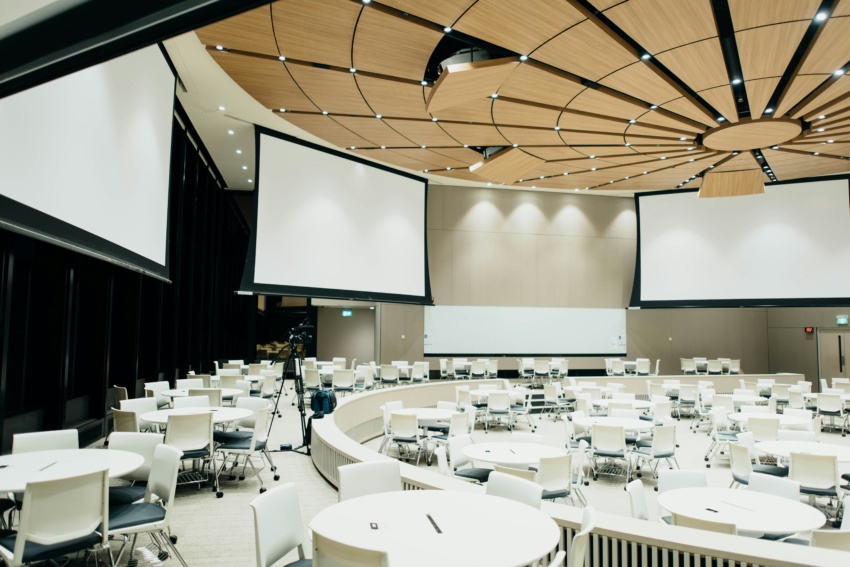The world of events is vast, varied and exciting. There’s no single way to enter the industry. And the role of an event planner can morph into different responsibilities and job titles depending on the company.
Different areas of events and event planning have different career paths and need different skills. For example, event planners plan events ranging from incentive travel trips to awards evenings, and everything in between.
This guide will walk you through how to become an event planner, event coordinator or event organizer. We'll also explore the different types of event planners. Including planners working in associations, corporate event planners and event planners working in event agencies.
Understanding the role of an event planner
Before diving into how to become an event organizer, it's essential to understand the role and responsibilities.
Event planners are responsible for organizing and coordinating various aspects of events. Event types include conferences, trade shows, corporate meetings and many more. You'll work closely with clients or stakeholders to understand the event's goals, manage budgets and the logistics of an event. Planning an event requires excellent communication, organization and problem-solving skills.
Types of organizations for business event planners
Different events will be organized by different types of companies. A trade show could be organized by an association or a company that organizes trade shows for various or singular industries. If you're interested in planning team building days, you might work at either a large corporation or a specialist event agency.
This means that there are several types of business event planners, each specializing in different areas of the industry. Understanding these roles can help you determine which path is the best fit for your skills and interests.
1. Association planners
As an association event planner, you’d work for membership-based organizations, such as trade associations or professional societies, organizing conferences and seminars, as well as other events that cater to the needs and interests of the organization's members.
2. Corporate event planners
Corporate event planners work within larger companies. They'll organize events such as product launches and team-building activities that meet company objectives such as employee engagement. They work closely with various stakeholders to ensure that the event aligns with the company's goals and objectives.

3. Agency event planners
These planners work for event planning agencies that provide event planning services to various clients. As an event planner working in an agency, you’ll work on a wide range of events. From corporate meetings to large-scale conferences and trade shows. Agency event planners need to be adaptable and able to manage multiple projects simultaneously.
How can you become an event planner, event organizer or event coordinator?
There are various different paths to becoming an event planner. Here are some ways to get started.
1. Gain relevant education and experience
While a degree is not always required to become an event planner, having a qualification in event planning, or in hospitality or communications can be beneficial. Colleges and universities offer courses in event planning, providing you with valuable knowledge and skills as well as opportunities for internships and industry contacts. Gaining experience through either internships or volunteer opportunities can help you build a strong foundation in the industry.

2. Develop your skill set
Event planners need a diverse skill set to succeed in their roles.
Some of the key skills event planners need include:
- Communication: Effective communication is crucial for event planners. You’ll need to effectively demonstrate and explain your ideas and plans to clients, vendors and team members.
- Organization: Event planning requires you to be highly organized. You should be able to juggle multiple tasks and deadlines at the same time.
- Problem-solving: Unexpected issues can crop up without a moment's notice at an event. The ability to find solutions to new and emerging challenges is essential for event planners.
- Attention to detail: Planning an event often means planning people’s experiences of a brand or product. It’s important to get the details right. Planning and executing every aspect of an event well is critical for event success.
3. Get certified
Accreditation can help you stand out in a competitive job market. Some popular certifications include the Certified Meeting Professional (CMP) and the Certified Special Events Professional (CSEP). Certification not only looks good on your resumé, but they also help to grow your knowledge and understanding of the industry.
Learn more
4. Build a strong network
Networking can be essential to excel in the events industry. Having a strong professional network can help you create long lasting relationships and open doors to new roles. You can grow your network by attending industry conferences and joining professional organizations or associations. Using social media to connect with other event planners on platforms like LinkedIn can also help build a network.
IMEX Frankfurt and IMEX America are both opportunities to grow your network and connect with fellow event planners. If you're in higher education, the IMEX-MPI-MCI Future Leaders Forum is designed to help you connect with industry experts and fellow students.
At any stage of your career, IMEX can be the key to unlocking your networking and getting business done. IMEX Frankfurt and IMEX America’s networking opportunities, trade show floor and education program are there to help you level up.
A career in events is exciting and varied. Becoming a successful event planner requires dedication, hard work and a diverse skill set. Whether you choose to specialize and home in on one type of event, or become an all-rounder event organizer, the opportunities in the events industry are many and rewarding.
Frequently asked questions about becoming an event planner
1. Do I need a degree to become an event planner?
A degree isn’t mandatory, but can be helpful. Many successful event planners come from backgrounds in hospitality, communications or marketing. Degree programs and short courses in event management can provide foundational knowledge and open doors to internships and entry roles. However, practical experience—like volunteering at events or shadowing professionals—can be just as valuable, especially when paired with industry certifications like CMP or CSEP.
2. What’s the difference between an event planner, coordinator and organizer?
Responsibilities for these roles often overlap, but there are often subtle differences. An event planner typically manages the entire event process, from concept to execution. An event coordinator focuses more on logistics and ensuring everything runs smoothly on the day. An event organizer is a broader term that encompasses both planning and coordination.
3. How can I become an event planner with no experience?
Start small and build experience. You can volunteer at local events, help organize school or community functions, or start helping at your internal company events. These experiences help build your portfolio and develop essential skills like communication, organization and time management. Building a network is also key. You should attend industry events and connect with professionals on LinkedIn or through event associations.
4. What certifications are useful for event planners?
Certifications can boost your credibility and demonstrate your commitment to the profession. Two widely recognized credentials are the Certified Meeting Professional (CMP) and the Certified Special Events Professional (CSEP). These programs cover industry best practices and can help you stand out in a competitive job market. Find out more about accreditation
5. What types of companies hire event planners?
Event planners are needed in a variety of settings across many different industries. Associations hire planners for member-focused events including conferences. Corporations employ event planners for events such as team-building days, product launches and incentive travel. Event agencies offer services to multiple clients, providing variety and fast-paced work. Each environment offers different challenges and opportunities.
6. What skills are essential as an event planner?
Key skills for an events professional include communication, organization, problem-solving and attention to detail. As an event planner, you’ll need to manage multiple tasks, coordinate with vendors and clients, and adapt quickly to changes. Creativity and resilience are also important in this ever-changing and exciting industry. Creativity will help keep your attendees interested in your events and products. And resilience will make sure you’re ready to face any last-minute changes or crises.





